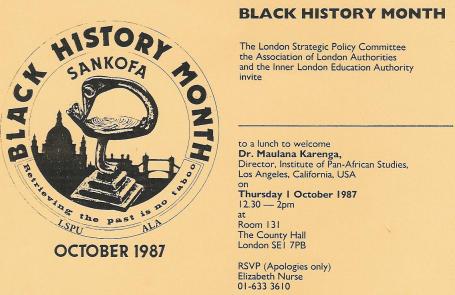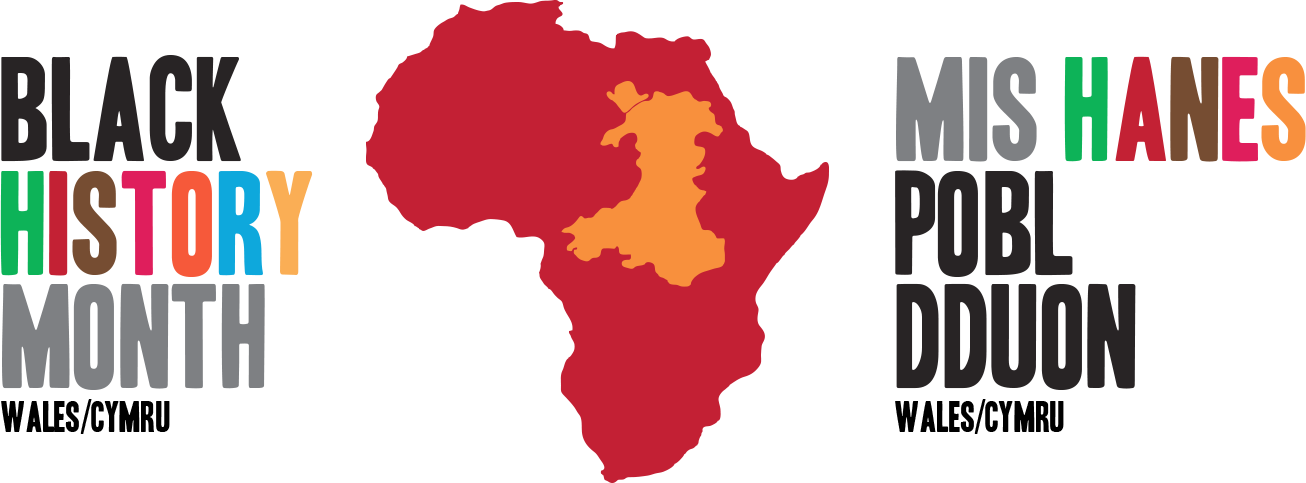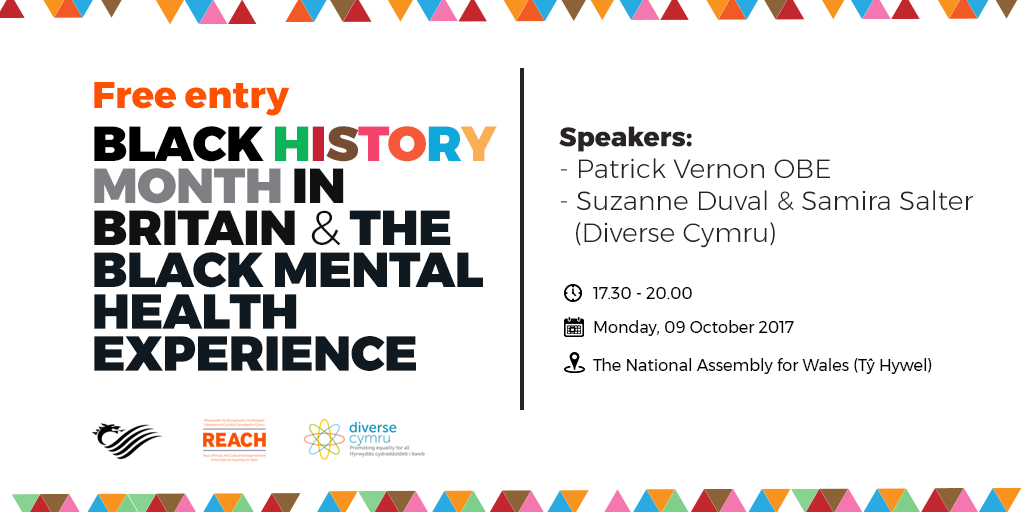Published 04/10/2017
| Last Updated 04/10/2017
First celebrated in the UK in 1987, this year marks the 30th anniversary of BHM in the UK. Black History Month Wales is also celebrating its 10th year anniversary.
Abi Lasebikan, Co-Chair of our Race Ethnicity and Cultural Heritage workplace equality network, takes us through the history of BHM...

Every October throughout the UK,
Black History Month (BHM) celebrates the achievements and contributions of Black people to: the development of British society; technology; the economy; the arts and culture.
“A people without the knowledge of their past history, origin and culture is like a tree without roots” - Marcus Garvey
History
The first ever BHM event was held in London in 1987. Akyaaba Addai Sebbo, coordinator of Special Projects for the Greater London Council (GLC) at the time, is acknowledged as the originator of BHM in the UK and
creating a collaboration to get it under way.
A colleague of mine, a woman, came to work one morning, looking very downcast and not herself. I asked her what the matter was, and she confided to me that the previous night when she was putting her son Marcus to bed he asked her, "Mum, why can't I be white?"
The mother was taken aback. She said that she was so shocked that she didn't know how to respond to her son. The boy that had been named after Marcus Garvey had asked why he couldn't be white!
- Akyaaba Addai Sebbo

It can arguably be said that the catalyst for BHM started eighteen months before the GLC was abolished in 1986. What followed in the months leading up to the GLC’s abolition was a concerted effort to find ways of carrying on the progressive equalities work of the GLC. The London Strategic Policy Unit (LSPU) made up of 15 Local Authorities, formed the body that took over the radical bits of the GLC after its abolition.
Linda Bellos, the then leader of Lambeth Council, remembers Ansell Wong, the then Head of the Ethnic Minority Unit, approaching her with the idea of
initiating Black History Month in the UK.
October was chosen, in contrast to being in February in the USA, because it was the date that fitted the Guest of Honor, Sally Mugabe and when the Commonwealth Institute venue was available.
When in October 1988 it was agreed that the LSPU would close, due to financial constraints, this was not the end of BHM, because the duty under Section 71 of the Race Relations Act 1976 allowed for the promotion of good race relations and the progressive Councils, which had supported the LSPU, tended to take that duty seriously so a series of Black History Month events across parts of London continued to be held.
This has grown to a UK wide event with over 6,000 events being celebrated across the UK every October. Activities such as lectures, conferences, concerts and specialist programmes continue to be in community centres, schools, libraries and museums, highlighting and celebrating the achievements and contributions that Black people have made to the development of British society, technology, economy, art and culture.
The relevance of Black History Month today
BHM creates a lot of debate, there are those who believe that there should not be a BHM, as Black history is part of the history of Britain, rather it should be studied and celebrated beyond the month of October. Some feel it is inconceivable to talk about British history without the presence or mention of African people, because African history is interwoven into the fabric of British history and vice versa.
“I don’t want Black History Month. Black history is American History”.
- Morgan Freeman
Others maintain that today, like in 1987, the exact contribution to the development of Britain that BME people have made is still not accurately represented in mainstream British history. Until the contribution of black people is studied, celebrated and showcased as part the national curriculum, additional educational activities, artistic programmes, college and university studies and museum and gallery exhibits 365 days of the year then BHM is still relevant.
In Wales
Black History Month Wales ensures that, as part of our shared history, the positive achievements and contributions that people of African descent have made to Welsh heritage, culture and history is captured and shared, through a wide range of creative activity for people of all ages.

Wales has a diverse and rich past which can, to some degree, be attributed to the fact that Wales was host to a number of key ports, in particular the Cardiff, Newport, Barry and Swansea Docks, which brought people from all over the world to Wales. This is partly why today Wales is such a multicultural country, host to numerous races and with the family origins of many black residents being linked to those key ports.
The National Assembly for Wales, the democratically elected body that represents the interests of Wales and its people, makes laws for Wales, agrees Welsh taxes and holds the Welsh Government to account, sits in the very heart of Cardiff Bay docks. It is therefore fitting that we recognise and value the diversity of our communities and the part they play in making us such a vibrant and tolerant nation. That is why we strive to be an accessible parliamentary body, which engages with and respects all of the people of Wales and beyond.
Events
We are pleased to announce that as part of our commitment to raising awareness of our work and enhancing our engagement with Black and Minority (BME) communities, we attended the BHM Wales Official Launch and Youth Awards 2017, on Friday 29 September at the Pierhead in Cardiff Bay.

Hosted by
Mark Drakeford, AM for Cardiff West, the theme of the event “our stars, our future, our history” provided an opportunity to not only look back, showcasing the impact that black people have on Welsh society, but take a forward look at our future trailblazers and contributors. The youth awards was a chance to recognise and celebrate the hard work, commitment and dedication of young people of African descent in Wales. The look of joy on the faces of the amazing young people, as they received their awards was truly wonderful to see.
Joyce Watson AM, Assembly Commissioner with responsibility for Equality, presented the Community Awards, which recognised the achievements of the BHM founders and contributors over the past 10 years.
Joyce, as one of the key note speakers spoke about the incredible importance of BHM, as it allows us to reflect on our joint history and how, paraphrasing Morgan Freeman, “Black History is Welsh History”. Emphasising how important it was that our organisation reflects the population that we serve she encouraged people to find out about and engage with the work of the Assembly and consider the Assembly as a place where they want to work.
Throughout the day there was a real buzz of excitement and celebration. Great entertainment, with music from Ysgol Gymraeg Bryn-y-Môr and storyteller and musician Bevin Magama, accompanied by Chief Amas Gbubemi, performed a vibrant and energetic dramatic piece. All set against the wonderful backdrop of the Pierhead. An apt location as it stands in the heart of Cardiff Bay, one of the most historically diverse areas of Wales and where BME men and women helped to shape the development of Wales.
We will also be attending/hosting:
 Every October throughout the UK, Black History Month (BHM) celebrates the achievements and contributions of Black people to: the development of British society; technology; the economy; the arts and culture.
Every October throughout the UK, Black History Month (BHM) celebrates the achievements and contributions of Black people to: the development of British society; technology; the economy; the arts and culture.
 It can arguably be said that the catalyst for BHM started eighteen months before the GLC was abolished in 1986. What followed in the months leading up to the GLC’s abolition was a concerted effort to find ways of carrying on the progressive equalities work of the GLC. The London Strategic Policy Unit (LSPU) made up of 15 Local Authorities, formed the body that took over the radical bits of the GLC after its abolition.
Linda Bellos, the then leader of Lambeth Council, remembers Ansell Wong, the then Head of the Ethnic Minority Unit, approaching her with the idea of initiating Black History Month in the UK.
October was chosen, in contrast to being in February in the USA, because it was the date that fitted the Guest of Honor, Sally Mugabe and when the Commonwealth Institute venue was available.
When in October 1988 it was agreed that the LSPU would close, due to financial constraints, this was not the end of BHM, because the duty under Section 71 of the Race Relations Act 1976 allowed for the promotion of good race relations and the progressive Councils, which had supported the LSPU, tended to take that duty seriously so a series of Black History Month events across parts of London continued to be held.
This has grown to a UK wide event with over 6,000 events being celebrated across the UK every October. Activities such as lectures, conferences, concerts and specialist programmes continue to be in community centres, schools, libraries and museums, highlighting and celebrating the achievements and contributions that Black people have made to the development of British society, technology, economy, art and culture.
It can arguably be said that the catalyst for BHM started eighteen months before the GLC was abolished in 1986. What followed in the months leading up to the GLC’s abolition was a concerted effort to find ways of carrying on the progressive equalities work of the GLC. The London Strategic Policy Unit (LSPU) made up of 15 Local Authorities, formed the body that took over the radical bits of the GLC after its abolition.
Linda Bellos, the then leader of Lambeth Council, remembers Ansell Wong, the then Head of the Ethnic Minority Unit, approaching her with the idea of initiating Black History Month in the UK.
October was chosen, in contrast to being in February in the USA, because it was the date that fitted the Guest of Honor, Sally Mugabe and when the Commonwealth Institute venue was available.
When in October 1988 it was agreed that the LSPU would close, due to financial constraints, this was not the end of BHM, because the duty under Section 71 of the Race Relations Act 1976 allowed for the promotion of good race relations and the progressive Councils, which had supported the LSPU, tended to take that duty seriously so a series of Black History Month events across parts of London continued to be held.
This has grown to a UK wide event with over 6,000 events being celebrated across the UK every October. Activities such as lectures, conferences, concerts and specialist programmes continue to be in community centres, schools, libraries and museums, highlighting and celebrating the achievements and contributions that Black people have made to the development of British society, technology, economy, art and culture.
 Wales has a diverse and rich past which can, to some degree, be attributed to the fact that Wales was host to a number of key ports, in particular the Cardiff, Newport, Barry and Swansea Docks, which brought people from all over the world to Wales. This is partly why today Wales is such a multicultural country, host to numerous races and with the family origins of many black residents being linked to those key ports.
The National Assembly for Wales, the democratically elected body that represents the interests of Wales and its people, makes laws for Wales, agrees Welsh taxes and holds the Welsh Government to account, sits in the very heart of Cardiff Bay docks. It is therefore fitting that we recognise and value the diversity of our communities and the part they play in making us such a vibrant and tolerant nation. That is why we strive to be an accessible parliamentary body, which engages with and respects all of the people of Wales and beyond.
Wales has a diverse and rich past which can, to some degree, be attributed to the fact that Wales was host to a number of key ports, in particular the Cardiff, Newport, Barry and Swansea Docks, which brought people from all over the world to Wales. This is partly why today Wales is such a multicultural country, host to numerous races and with the family origins of many black residents being linked to those key ports.
The National Assembly for Wales, the democratically elected body that represents the interests of Wales and its people, makes laws for Wales, agrees Welsh taxes and holds the Welsh Government to account, sits in the very heart of Cardiff Bay docks. It is therefore fitting that we recognise and value the diversity of our communities and the part they play in making us such a vibrant and tolerant nation. That is why we strive to be an accessible parliamentary body, which engages with and respects all of the people of Wales and beyond.
 Hosted by Mark Drakeford, AM for Cardiff West, the theme of the event “our stars, our future, our history” provided an opportunity to not only look back, showcasing the impact that black people have on Welsh society, but take a forward look at our future trailblazers and contributors. The youth awards was a chance to recognise and celebrate the hard work, commitment and dedication of young people of African descent in Wales. The look of joy on the faces of the amazing young people, as they received their awards was truly wonderful to see.
Joyce Watson AM, Assembly Commissioner with responsibility for Equality, presented the Community Awards, which recognised the achievements of the BHM founders and contributors over the past 10 years.
Joyce, as one of the key note speakers spoke about the incredible importance of BHM, as it allows us to reflect on our joint history and how, paraphrasing Morgan Freeman, “Black History is Welsh History”. Emphasising how important it was that our organisation reflects the population that we serve she encouraged people to find out about and engage with the work of the Assembly and consider the Assembly as a place where they want to work.
Throughout the day there was a real buzz of excitement and celebration. Great entertainment, with music from Ysgol Gymraeg Bryn-y-Môr and storyteller and musician Bevin Magama, accompanied by Chief Amas Gbubemi, performed a vibrant and energetic dramatic piece. All set against the wonderful backdrop of the Pierhead. An apt location as it stands in the heart of Cardiff Bay, one of the most historically diverse areas of Wales and where BME men and women helped to shape the development of Wales.
We will also be attending/hosting:
Hosted by Mark Drakeford, AM for Cardiff West, the theme of the event “our stars, our future, our history” provided an opportunity to not only look back, showcasing the impact that black people have on Welsh society, but take a forward look at our future trailblazers and contributors. The youth awards was a chance to recognise and celebrate the hard work, commitment and dedication of young people of African descent in Wales. The look of joy on the faces of the amazing young people, as they received their awards was truly wonderful to see.
Joyce Watson AM, Assembly Commissioner with responsibility for Equality, presented the Community Awards, which recognised the achievements of the BHM founders and contributors over the past 10 years.
Joyce, as one of the key note speakers spoke about the incredible importance of BHM, as it allows us to reflect on our joint history and how, paraphrasing Morgan Freeman, “Black History is Welsh History”. Emphasising how important it was that our organisation reflects the population that we serve she encouraged people to find out about and engage with the work of the Assembly and consider the Assembly as a place where they want to work.
Throughout the day there was a real buzz of excitement and celebration. Great entertainment, with music from Ysgol Gymraeg Bryn-y-Môr and storyteller and musician Bevin Magama, accompanied by Chief Amas Gbubemi, performed a vibrant and energetic dramatic piece. All set against the wonderful backdrop of the Pierhead. An apt location as it stands in the heart of Cardiff Bay, one of the most historically diverse areas of Wales and where BME men and women helped to shape the development of Wales.
We will also be attending/hosting:
 ‘Black History Month in Britain and the black mental health experience’ Monday 09 October, The National Assembly for Wales
17.30 - 20.00 You’re welcome to attend this free public event but places are limited, so please secure your place as soon as possible.
‘Black History Month in Britain and the black mental health experience’ Monday 09 October, The National Assembly for Wales
17.30 - 20.00 You’re welcome to attend this free public event but places are limited, so please secure your place as soon as possible.
